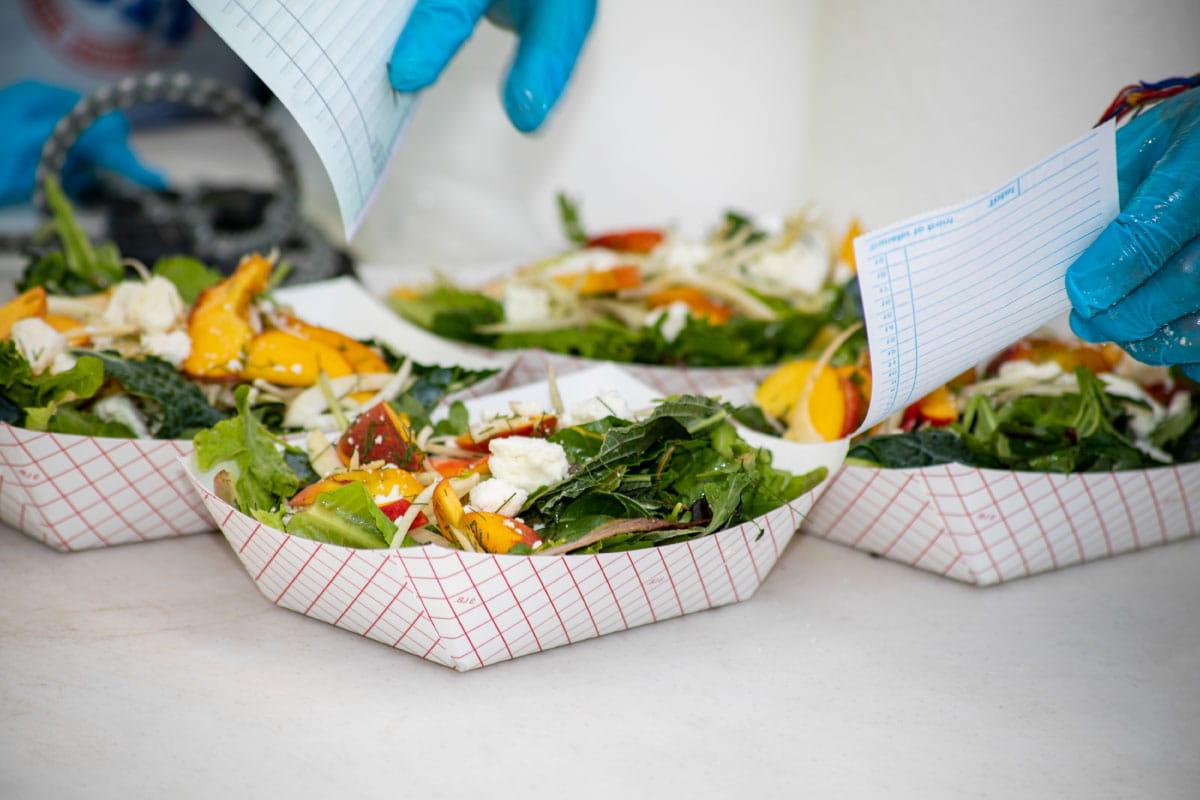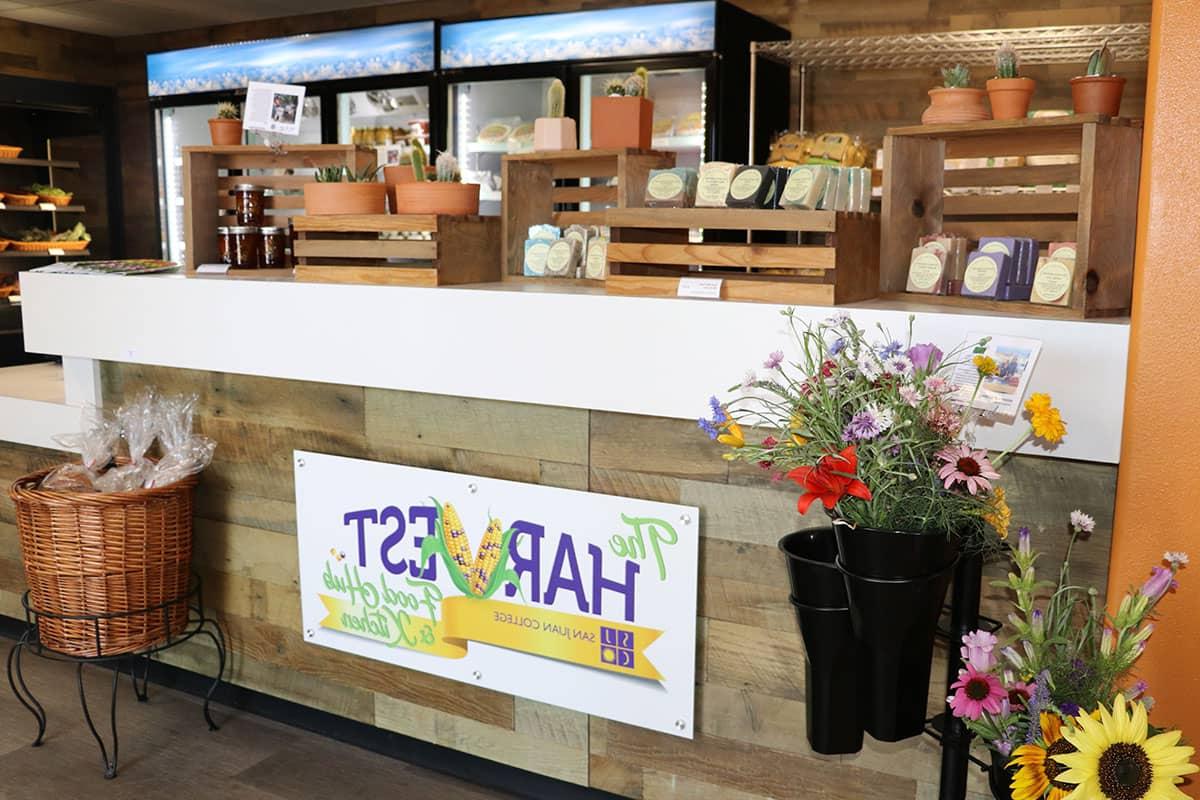Dive into a fresh experience with the Harvest Food Hub & Kitchen!
As an innovative project by the EDA University Center, we're your one-stop marketplace for locally sourced food in San Juan County. Shop online or in our retail marketplace!
Whether you're a farmer aiming to expand your reach or a food lover craving sustainable choices, our platform caters to everyone. From weekly farm boxes to a bustling retail marketplace, every offering is geared towards bringing the community closer to its food roots. Discover more about our upcoming season and how we're revolutionizing the local food scene!
The Harvest Food Hub is Gearing Up for the 2024 Season!
- Farm Box Subscription: Registration is now open for our weekly Farm Box subscription. Pick-up will be every Thursday from June 27, 2024 -Oct 10, 2024. Sign up for the Farm Box today!
- The Harvest Market: Our retail marketplace offers fresh produce, meats, and value-added products. Opening date is June 1, 2024. The market will be closed during construction and will re-open when the rennovation is completed.
- Location: 310 W. Animas Street
- Hours: Wednesday - Friday 3 p.m. to 6:30 p.m. and Saturday 11 a.m. to 3 p.m. (open during growing season)
- Online Ordering: Online Ordering will be available after construction has finished at the Downtown Location. Check back for further updates.
- Wholesale customers such as school districts, restaurants and other wholesale buyers can place their orders online during the growing season. Place your online order here. Contact our Kitchen Manager if you would like to sign up for a weekly produce list, delivered to your inbox: montoyajr@sxtcyb.com
If you are a producer of produce or processed foods and are interested in applying for the 2024 season, please contact our Project Manager at harvest@sxtcyb.com for Growers and Artisan Meats Vendor Applications

The Harvest Kitchen
Do you have an idea for a restaurant, food truck or retail food product? Would you like help growing your idea into a business? The Harvest Kitchen is a new resource for food entrepreneurs in the Four Corners area.

Food Producers: Reach new markets for your produce
The Harvest Food Hub can help you with:
- Providing services such as cold storage and transportation
- Training on food safety and business development
- Branding and promotion for farms
- Additional services (bulk purchasing, processing, etc.)
Resources for Farmers
Many fruit and vegetable producers in San Juan County sell direct-to-consumer, such as at farm stands or at farmers’ markets. However, there are many opportunities to sell produce in other markets as well—such as schools, restaurants, and institutions. While the San Juan College Harvest Food Hub will help facilitate these sales, below are some resources for farmers to make the connections independently.
Tips for making a new sale:
- Tell your farm story
- Make personal connections—introduce yourself (it's all about relationships and communication)
- Establish your market and grow for it
- Know industry standards (packaging, grading, etc.)
General Resources:
- UC Davis Agricultural Sustainability Institute Resources on selling wholesale
- Cornell Small Farm Program
Selling to Schools:
While most schools source the majority of their produce from large-scale distributors at low cost, districts are not required to purchase all produce from a single distributor. In fact, New Mexico has funding options in place to increase local produce in school lunches across the state. It is best to reach out to the food service coordinator at your local school district to inquire about selling to schools.
Selling to Restaurants:
Restaurants can be a reliable customer for your quality local produce. Locally owned restaurants often benefit from having local produce on their menus, especially if this can be communicated to the customers. Be sure to work with the restaurants to communicate your farm story.
When working with restaurants, it is essential to ensure constant communication and quality of the product. It is best to contact the Executive Chef about starting sales to local restaurants. Keep in mind that restaurants may have small order sizes and require frequent delivery.
In 2011, the Food Safety Modernization Act was signed into law, creating the Produce Safety Rule (PSR). The Produce Safety Rule gives regulatory power of fresh produce to the Food and Drug Administration (FDA). While it has always been illegal to sell contaminated produce, there are new requirements with exemptions based on dollar of sales and whom you are selling to. The exemption that most likely applies to farmers in San Juan County is for any farmer who sells less than $25,000 in produce. Another exemption is for farmers who sell less than $500,000 in food (a category that includes more than produce) if half is sold to a certified end user. Some of these concepts and definitions can be confusing, so be sure to check out the resources below to understand what requirements affect your farm business.
Besides the federal produce safety requirements, many wholesale buyers require separate food safety audits from their producers. The most common is “Good Agricultural Practices” (GAP), a regulatory body that farmers may choose to become certified through. Many large institutions, such as grocery chains and distribution companies, require farms they buy from to be GAP certified.
In New Mexico, farmers interested in selling to the schools (who are not already GAP certified) will be required to comply with a separate set of food safety practices. NMFMA and La Montañita Coop offer “Tier 1” and “Tier 2” Farm food safety trainings, as well as provide a document for an on-farm risk assessment.
Even if you are not interested in selling to the schools or becoming GAP certified, it is a good idea to have a farm food safety plan and attend trainings on farm food safety to protect yourself. Again, it is still illegal to sell contaminated produce, and having a food safety and traceability plan in place can give your customers confidence that any sickness they have did not come from your farm.
See below some resources to help navigate food safety for farms and businesses:
General:
Local Food Safety Collaborative:
GAP and GHP
FSMA
Home-based food processing regulations
City of Farmington Business License
Writing a food safety plan:
Resources from Cornell and PSA on how to write a food safety plan
New Mexico Trainings:
Farmington Business Resources:
Small Business Development Center (SBDC)
Farmington Women's Business Center, WESST
San Juan College Enterprise Center
Online Resources:
Cornell Small Farms Program Business Plan Templates
Business Resources for those Starting to Farm or for an existing Farm
Building a Sustainable Business
Processing for profits


